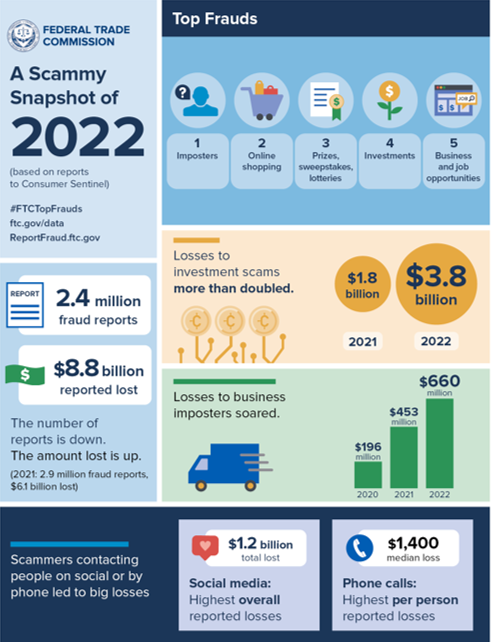There are prime numbers, irrational numbers, and Fibonacci’s numbers – but from a consumer protection perspective, no number is quite as sobering as the dollar amount that people reported losing to fraud in 2022. According to new data from the FTC, that number is almost $8.8 billion and it’s up 30% over the year before.
The Consumer Sentinel Network Data Book reflects reports received through the Consumer Sentinel Network, a database of information reported directly by consumers as well as from federal, state, and local law enforcement agencies, the Better Business Bureau, industry groups, and non-profit organizations. The 2022 numbers suggest some disturbing trends about what scammers are up to.
- Reported fraud losses are up. The Consumer Sentinel Network received 2.4 million fraud reports in 2022, down from 2.9 million in 2021. But the almost $8.8 billion in total reported losses in 2022 surpasses the $6.1 billion figure from 2021.
- Imposter scams top the Fraudulent Five. In terms of the number of fraud reports received, #1 on the list is Imposter Scams, followed by #2 Online Shopping, #3 Prizes, Sweepstakes, and Lotteries, #4 Investments, and #5 Business and Job Opportunities.
- Losses to business imposters have skyrocketed. People reported losing $2.6 billion to imposters in 2022, an increase from $2.4 billion the year before. A notable trend relates to the rise of business imposters – scammers who falsely claim affiliations with well-known companies. In 2020, reported losses to business imposters was $196 million. That figure rose to $453 million last year and soared to $660 million in 2022.
- Investment scams are on a troubling upswing. Doubling growth in just one year might sound like good news for business, but not if the business is investment scams. In 2022 consumers reported losing more money to that form of fraud – nearly $3.8 billion – than to any other category. That figure is more than twice the losses from investment scams that consumers reported in 2021.
- Scammers go social. Losses facilitated via social media platforms totaled $1.2 billion in 2022, although phone scams yielded the highest reported loss per person with a median of $1,400.
The release of these numbers may seem like a strange time to offer a “thank you,” but one is definitely in order. The FTC – and the approximately 2,800 federal, state, local, and international law enforcement professionals who have authorization to access Consumer Sentinel data – thank consumers for taking the time to file those 2.4 million fraud reports in 2022. The information has proven invaluable in helping consumer protection professionals spot trends, conduct investigations, warn people about new forms of fraud, and ultimately bring scammers to justice.
Why should businesses care about these stats? Because $8.8 billion pocketed by fraudsters means $8.8 billion less for consumers to spend on goods and services offered by honest businesses. In addition, the rise of business imposters should be particularly troubling since it could be your company’s good name that scammers are stealing. And those dollar figures don’t take into account the incalculable losses in consumer confidence in the marketplace.
Looking for more information sliced and diced by state, sector, and subcategory? Visit the FTC’s data analysis site at ftc.gov/exploredata. And if you spot a scam or questionable business practice in 2023, report your experience at ReportFraud.ftc.gov.


It is your choice whether to submit a comment. If you do, you must create a user name, or we will not post your comment. The Federal Trade Commission Act authorizes this information collection for purposes of managing online comments. Comments and user names are part of the Federal Trade Commission’s (FTC) public records system, and user names also are part of the FTC’s computer user records system. We may routinely use these records as described in the FTC’s Privacy Act system notices. For more information on how the FTC handles information that we collect, please read our privacy policy.
The purpose of this blog and its comments section is to inform readers about Federal Trade Commission activity, and share information to help them avoid, report, and recover from fraud, scams, and bad business practices. Your thoughts, ideas, and concerns are welcome, and we encourage comments. But keep in mind, this is a moderated blog. We review all comments before they are posted, and we won’t post comments that don’t comply with our commenting policy. We expect commenters to treat each other and the blog writers with respect.
We don't edit comments to remove objectionable content, so please ensure that your comment contains none of the above. The comments posted on this blog become part of the public domain. To protect your privacy and the privacy of other people, please do not include personal information. Opinions in comments that appear in this blog belong to the individuals who expressed them. They do not belong to or represent views of the Federal Trade Commission.
Too much white collar crime and much of it is handled in Federal court
that thinks in terms of months of incarceration and not years as is
more often done in State Court. Need more jail TIME.
interesting post
Hi ftc.gov webmaster, Thanks for the well-organized post!
I’m believing the FTC may be in bed with the “scammers”. Does the US not have the best cybersecurity??